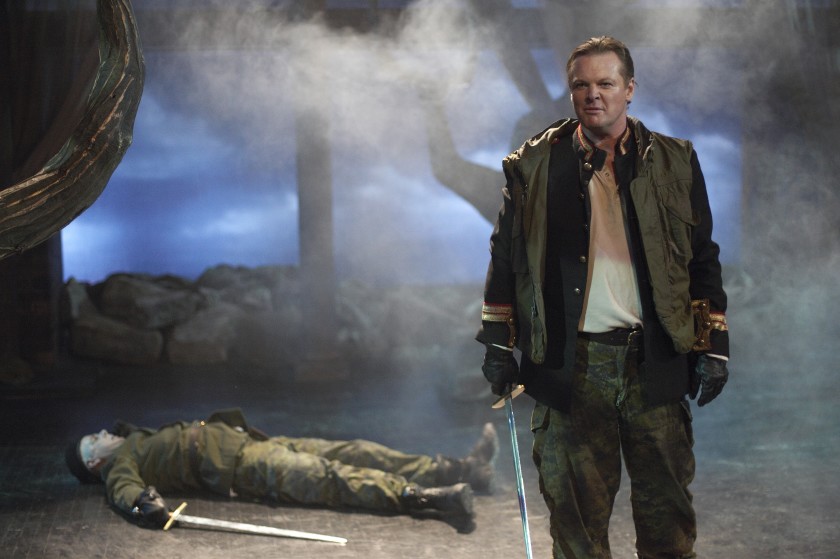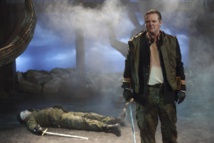The show was written by Susan Coyne, a veteran of Canada's Stratford Festival, on which the series is more or less based; Mark McKinney, from the sketch group Kids in the Hall and currently of NBC's "Superstore"; and comedian and actor Bob Martin, who won a Tony Award for the book of "The Drowsy Chaperone" along with Don McKellar - who plays Darren, a pretentious director, in "Slings." McKinney plays Richard, the festival's money-minded general manager, usually at odds with the artists; Coyne is administrative assistant Anna, who actually keeps the place running.
I'm not saying it's, you know, Shakespeare, but like Shakespeare it's a kit that contains everything human. (And it is full of actual Shakespeare, very well done.) A backstage drama and comedy of art and commerce, love and power, life and death and the beyond, it's as great a show as television has brought forth, in this or any other age - droll, poetical, satirical, sincere, allusive, immediate, romantic, unsentimental, thrilling and incidentally informative.
The Times recently sat down with McKinney and Coyne to discuss the series' creation, the fourth season they imagined, and the prequel they are currently shopping.
Q. Mark, you came up through comedy. Did you have a theater background before that?
McKinney: Yes I did. I started at the Loose Moose Theatre of Calgary, which is an improvisational theater company run by Keith Johnstone - along with Del Close and Viola Spolin, the three-headed god of improv. He was an improv purist. He saw it is a technique for actors to keep fresh. In Kids in the Hall, I was kind of the actor-y one; I was always interested in the dramatic (elements) of comedy; I think they're kind of inseparable, actually.
Q.What was your first meaningful experience of Shakespeare?
McKinney: It was a famous production of "Hamlet" with Nicholas Pennell and Richard Monette, who eventually became the artistic director of Stratford; they would trade off, like rotating quarterbacks. That was in high school, and it was the first time I kind of got it. Years later, I was in therapy. I don't think I'm telling tales out of school, but there was a famous picture my shrink had, a picture of Pennell and Monette with skulls over their crotches. And he had treated both of them because, apparently, that had gone quite deep into it.
Coyne: I'm tempted to say when I was 5 years old, because I wrote a book about it ("Kingfisher Days," 2002). There was a teacher who lived next door who introduced me to Shakespeare. But it was when I went to Stratford and worked with this incredibly charismatic director named Robin Phillips, who'd been the artistic director there. And he just lit a light inside everyone who worked with him about Shakespeare, and made it seem completely contemporary, and made you feel like you had an honorable duty to protect it from people who treated it like museum theater. There's as lot of Robin in the Oliver character.
McKinney: I just realized we both had genius directors. 'Cause Keith Johnstone's a genuine genius, a weirdo -
Coyne: They're almost always weirdos.
McKinney: A detail: Robin was aging and getting a little frail, a few years ago, and Susan and Martha Burns decided to try to capture what was magic about his teaching. So they went looking for a guinea pig who'd never done Shakespeare -
Coyne: A useful idiot.
McKinnie: So they got me to go and learn a "Richard III" monologue with him, and they made it into a movie ("Robin and Mark and Richard III," 2016). And it's one of the favorite experiences of my life.
Q. Did you have a history before writing "Slings & Arrows"?
McKinney: Susan was a serious, legit actress when I arrived in Toronto in 1980 or whenever it was. Her picture was already on the walls of some of the theaters. I met her when she had already started working on (what would become "Slings & Arrows"). It was then a half-hour, lighter, frothier thing. And our producer, Niv Fichman, invited me to get involved. A friend had sent me screeners of "The Sopranos," which had not come out yet, and suddenly an hour of television - it was a massively different, serialized, beautiful, psychological, funny, dense thing. And then Susan brilliantly one day came up with the idea of a ghost, which seemed to pull everything together. And shortly after that Bob was available, so we all clicked and settled around Susan's kitchen table for what seemed like both years and five wonderful minutes of yapping, and it was done. The network that commissioned it dropped it at the eleventh hour, but our very tenacious producer harangued another network while he was an in elevator with the executive, and we got a deal.
Q. What was the pitch?
McKinney: It's about the arts, it's about us, it's about the impossibility of making good theater, it's about the relative weight of money. Here's this bloated festival that's drifted off course, and also here's a person (Geoffrey) struggling maniacally (to stage theater) with no money - and neither are really in any kind of happy place. They have a past, and this opportunity opens up.
Coyne: We didn't want to just tell the story of the actors, because no theater festival, or theater, can exist without everyone else. And also (to McKinney) your character and my character, the people in administration, were often looked down upon - who were actually holding it together with spit and tape and got no thanks for it. We wanted to tell that story as well, tell a sympathetic version of what it's like to run a festival.
Q. Did you always know you'd be in it?
McKinney: I can't remember. I do remember being kind of annoyed I had to audition for the part.
Now you've written a prequel, "Amateurs."
McKinney: Yes. I've always loved that word, because of the Latin root, "to love." There was kind of a lot of "Could you do a Season 4?" and we noodled around with the prison idea for a long time.
The prison idea?
McKinney: What were the points? Darren has taken over the festival with his insane musical productions, and now Richard wants to conspire against him and drag Paul Gross back into the festival, even though he's now discovered a brilliant (actor) - was "Richard III" the play we were going to do? - in prison, a murderer, a psychopath, and of course he wants to bring him with him. We were driving down (to Stratford) and started talking about Cyril and Frank (gay, older members of the New Burbage company, played by Graham Harley and Michael Polley), because you were explaining to me how nice it was to drive down in the spring, and we thought, "Oh, my God, Cyril and Frank, what would it have been like in 1953 if they had been part of the original festival, not knowing that they were about to walk into the first society that would embrace who they were?"
Coyne: I'd known a lot of those people when I worked at Stratford, the people who started it. It's like listening to people talk about the war, the glory days.
McKinney: And they nearly didn't make it. I don't know how much we can give away without spoiling it. The story we borrowed from the original Stratford story, so I can't remember exactly what's true and what's not, but most of this is true. In 1950s England, they were exhausted by the war - gone was the spirit. The trade union wars, the black fog that nearly killed everybody, and that kind of ossified Shakespeare (makes a bellowing noise). There was a very famous Irish director - Irish, so he's never going to be part of the inner inner group - who had managed to keep things kind of alive; but no one wanted any serious themes, and he was in despair because he couldn't get anything going. This is Tyrone Guthrie (who would help launch the Canadian Stratford festival).
And meanwhile, over in Canada, Ontario's main industry, which is repairing steam locomotives, was collapsing because of diesel trains. And in 1952 North America, this is an impossible situation, because everywhere is booming. And our character - and this is true, the real guy who founded the Stratford festival, cofounded it - worked as a junior editor for a monthly magazine on civic sewage. He was the one who kind of went, "Hmmm, Stratford, Stratford - how about we have a Shakespeare ... "
Coyne: Had never seen a play in his life, let alone Shakespeare.
McKinney: So he was, "Let's have a parade - you, know, dress up as Romeo and Juliet, do a few monologues, maybe during the pork festival," which was their big festival at the time.
Coyne: This is where it sort of turns into "The Music Man." He didn't know anything about theater, and said, "This could work."
Q. When you came to write "Slings & Arrows," was "Hamlet" the obvious play to do first?
Coyne: Yes. It's so close to the actor's experience, anyway. It is the actor's nightmare, because it's so huge and famous - for instance, Daniel Day-Lewis walked offstage during a production. It literally drove him mad. He thought that he saw his own father's ghost onstage. There's lots of great stories like that.
McKinney: I think that was the attraction. We were circling the madness, and then it resolved into the ghost.
The dramaturgy in the series is so smart. The show does really offer a door into understanding Shakespeare.
Coyne: I remember we were watching "The West Wing" when it first came out, characters talking about - I have no idea why dairy subsidies are so important; I sure want to know more about 'em. Because the characters were so passionate. And we took a chance to believe that if we could make characters people cared about, they would somehow care about the same things (the characters) cared about. And it had to be what they would really care about, which are things like line endings and verse, and that (Shakespeare's) characters are very real to them, very real. And I know that we were nervous about it, 'cause it could look ridiculous to other people - we always said that the characters should take what they do seriously and we should take it seriously, but we don't take the characters seriously. The characters can be ridiculous, but what they love is not ridiculous.
It's amazing to me how this little show that started around my kitchen table and really nearly died many, many times, we're like, "Well, we'll just make this. 'Cause no one's going to watch it. It's Canadian theater. It's Canadian television." It's freeing in a way, when you think no one's watching. "Let's just do it the way we like, OK?"
McKinney: Susan's kitchen table. We should donate that to the Canadian television museum, if there ever is one.
Coyne: I agree. But I also think, and this is my experience, what we were all experiencing, because we were all talking about our lives, our life in the arts - there's something very melancholy about doing something you love, because it will never be good enough, it will always break your heart.
McKinney: Or it will be fleeting.
Coyne: It'll be fleeting. You come together with people you feel passionately connected to and two weeks later they're tearing down the sets.
--------------------------------------------------------------------------------------------------------









 Home
Home Politics
Politics











